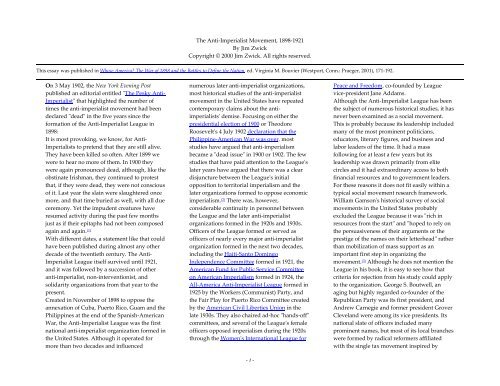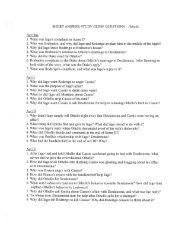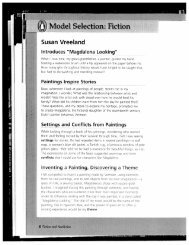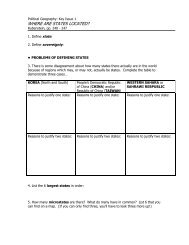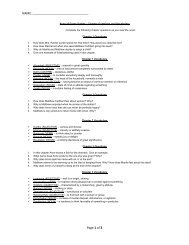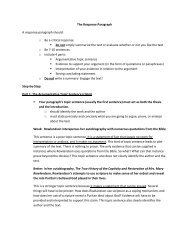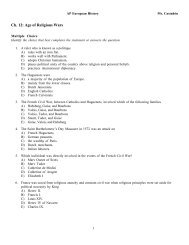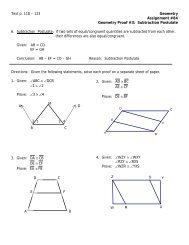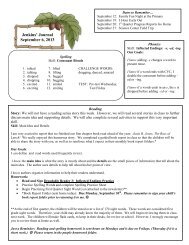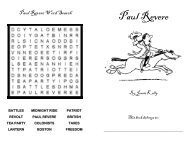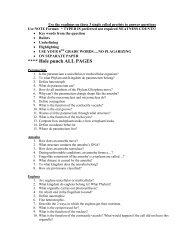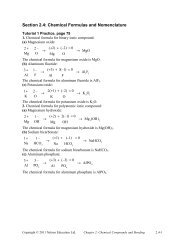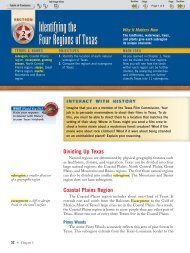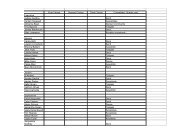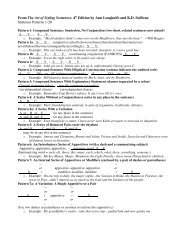The Anti-Imperialist Movement, 1898-1921 - Teacher
The Anti-Imperialist Movement, 1898-1921 - Teacher
The Anti-Imperialist Movement, 1898-1921 - Teacher
You also want an ePaper? Increase the reach of your titles
YUMPU automatically turns print PDFs into web optimized ePapers that Google loves.
<strong>The</strong> <strong>Anti</strong>‐<strong>Imperialist</strong> <strong>Movement</strong>, <strong>1898</strong>‐<strong>1921</strong><br />
By Jim Zwick<br />
Copyright © 2000 Jim Zwick. All rights reserved.<br />
This essay was published in Whose America? <strong>The</strong> War of <strong>1898</strong> and the Battles to Define the Nation, ed. Virginia M. Bouvier (Westport, Conn.: Praeger, 2001), 171‐192.<br />
On 3 May 1902, the New York Evening Post<br />
published an editorial entitled ʺ<strong>The</strong> Pesky <strong>Anti</strong>‐<br />
<strong>Imperialist</strong>ʺ that highlighted the number of<br />
times the anti‐imperialist movement had been<br />
declared ʺdeadʺ in the five years since the<br />
formation of the <strong>Anti</strong>‐<strong>Imperialist</strong> League in<br />
<strong>1898</strong>:<br />
It is most provoking, we know, for <strong>Anti</strong>‐<br />
<strong>Imperialist</strong>s to pretend that they are still alive.<br />
<strong>The</strong>y have been killed so often. After 1899 we<br />
were to hear no more of them. In 1900 they<br />
were again pronounced dead, although, like the<br />
obstinate Irishman, they continued to protest<br />
that, if they were dead, they were not conscious<br />
of it. Last year the slain were slaughtered once<br />
more, and that time buried as well, with all due<br />
ceremony. Yet the impudent creatures have<br />
resumed activity during the past few months<br />
just as if their epitaphs had not been composed<br />
again and again. (1)<br />
With different dates, a statement like that could<br />
have been published during almost any other<br />
decade of the twentieth century. <strong>The</strong> <strong>Anti</strong>‐<br />
<strong>Imperialist</strong> League itself survived until <strong>1921</strong>,<br />
and it was followed by a succession of other<br />
anti‐imperialist, non‐interventionist, and<br />
solidarity organizations from that year to the<br />
present.<br />
Created in November of <strong>1898</strong> to oppose the<br />
annexation of Cuba, Puerto Rico, Guam and the<br />
Philippines at the end of the Spanish‐American<br />
War, the <strong>Anti</strong>‐<strong>Imperialist</strong> League was the first<br />
national anti‐imperialist organization formed in<br />
the United States. Although it operated for<br />
more than two decades and influenced<br />
numerous later anti‐imperialist organizations,<br />
most historical studies of the anti‐imperialist<br />
movement in the United States have repeated<br />
contemporary claims about the anti‐<br />
imperialistsʹ demise. Focusing on either the<br />
presidential election of 1900 or <strong>The</strong>odore<br />
Rooseveltʹs 4 July 1902 declaration that the<br />
Philippine‐American War was over, most<br />
studies have argued that anti‐imperialism<br />
became a ʺdead issueʺ in 1900 or 1902. <strong>The</strong> few<br />
studies that have paid attention to the Leagueʹs<br />
later years have argued that there was a clear<br />
disjuncture between the Leagueʹs initial<br />
opposition to territorial imperialism and the<br />
later organizations formed to oppose economic<br />
imperialism. (2) <strong>The</strong>re was, however,<br />
considerable continuity in personnel between<br />
the League and the later anti‐imperialist<br />
organizations formed in the 1920s and 1930s.<br />
Officers of the League formed or served as<br />
officers of nearly every major anti‐imperialist<br />
organization formed in the next two decades,<br />
including the Haiti‐Santo Domingo<br />
Independence Committee formed in <strong>1921</strong>, the<br />
American Fund for Public Service Committee<br />
on American Imperialism formed in 1924, the<br />
All‐America <strong>Anti</strong>‐<strong>Imperialist</strong> League formed in<br />
1925 by the Workers (Communist) Party, and<br />
the Fair Play for Puerto Rico Committee created<br />
by the American Civil Liberties Union in the<br />
late 1930s. <strong>The</strong>y also chaired ad‐hoc ʺhands‐offʺ<br />
committees, and several of the Leagueʹs female<br />
officers opposed imperialism during the 1920s<br />
through the Womenʹs International League for<br />
- 1 -<br />
Peace and Freedom, co‐founded by League<br />
vice‐president Jane Addams.<br />
Although the <strong>Anti</strong>‐<strong>Imperialist</strong> League has been<br />
the subject of numerous historical studies, it has<br />
never been examined as a social movement.<br />
This is probably because its leadership included<br />
many of the most prominent politicians,<br />
educators, literary figures, and business and<br />
labor leaders of the time. It had a mass<br />
following for at least a few years but its<br />
leadership was drawn primarily from elite<br />
circles and it had extraordinary access to both<br />
financial resources and to government leaders.<br />
For these reasons it does not fit easily within a<br />
typical social movement research framework.<br />
William Gamsonʹs historical survey of social<br />
movements in the United States probably<br />
excluded the League because it was ʺrich in<br />
resources from the startʺ and ʺhoped to rely on<br />
the persuasiveness of their arguments or the<br />
prestige of the names on their letterheadʺ rather<br />
than mobilization of mass support as an<br />
important first step in organizing the<br />
movement. (3) Although he does not mention the<br />
League in his book, it is easy to see how that<br />
criteria for rejection from his study could apply<br />
to the organization. George S. Boutwell, an<br />
aging but highly regarded co‐founder of the<br />
Republican Party was its first president, and<br />
Andrew Carnegie and former president Grover<br />
Cleveland were among its vice presidents. Its<br />
national slate of officers included many<br />
prominent names, but most of its local branches<br />
were formed by radical reformers affiliated<br />
with the single tax movement inspired by
Henry Georgeʹs 1879 book, Progress and Poverty.<br />
Single‐taxers founded and served as president<br />
and/or secretary of the branches in New York,<br />
Philadelphia, Cincinnati, and Minneapolis, and<br />
played a prominent role in the creation of both<br />
the Central <strong>Anti</strong>‐<strong>Imperialist</strong> League and the<br />
national American <strong>Anti</strong>‐<strong>Imperialist</strong> League<br />
based in Chicago.<br />
Despite the prestige and financial wealth of<br />
some of its officers, the League deserves<br />
recognition as the social movement<br />
organization that started what has become a<br />
long tradition of opposition to foreign<br />
interventions by the United States. Because the<br />
League was the first such organization formed<br />
in the United States, it represents the beginning<br />
of the anti‐imperialist social movement sector<br />
that would later include organizations formed<br />
by or allied with the Communist Party USA as<br />
well as many of todayʹs numerous country‐ or<br />
region‐specific solidarity organizations. (4) With<br />
significantly less access to financial resources<br />
and mainstream political leaders, these later<br />
organizations fit more closely what scholars<br />
generally define as social movements. <strong>The</strong><br />
League was formed during a dramatic and<br />
unusual split within the countryʹs elite over the<br />
annexations of <strong>1898</strong> and 1899, and it could<br />
immediately count upon the support of many<br />
of the countryʹs leading politicians and some of<br />
its wealthiest men and women. All later<br />
organizations have had to start further from the<br />
halls of power, but can be viewed as part of a<br />
continuum of anti‐imperialist organizing that<br />
has spanned the twentieth century. This is a<br />
common sense approach that is routinely<br />
applied in historical discussions of organizing<br />
on womenʹs rights, civil rights, peace, labor,<br />
etc., but which is rarely applied in studies of<br />
anti‐imperialists from the 1890s to the present. (5)<br />
In particular, the marginalization of more recent<br />
anti‐imperialist organizations within the United<br />
States cannot be fully understood without<br />
looking at the processes involved in the<br />
marginalization of the <strong>Anti</strong>‐<strong>Imperialist</strong> League<br />
from <strong>1898</strong> to its demise in <strong>1921</strong>.<br />
Three periods in the Leagueʹs history during<br />
which the anti‐imperialist movement<br />
experienced splits that diminished the power of<br />
the movement and ultimately led to its<br />
dissolution are examined here. <strong>The</strong>y are the<br />
election of 1900, during which the strategy of<br />
partisan political endorsement was the primary<br />
issue; the period from 1904‐1905, when a split<br />
occurred over definitions of imperialism and<br />
some membersʹ attempts to gain influence with<br />
the Republican Party; and the period from 1912‐<br />
<strong>1921</strong>, when a split that erupted between the<br />
<strong>Anti</strong>‐<strong>Imperialist</strong> League and the Filipino<br />
independence movement ended in the<br />
dissolution of the former. I examine how the<br />
<strong>Anti</strong>‐<strong>Imperialist</strong> League positioned itself in<br />
relation to macro political changes, including<br />
the formation of rival organizations, and in<br />
relation to its individual members. This<br />
approach illuminates why it is useful to view<br />
the League within the context of the broader<br />
anti‐imperialist social movement sector, and<br />
highlights the influence of specific individuals<br />
within the organizations. Changes in political<br />
conditions certainly influenced the Leagueʹs<br />
history but its longevity and enduring influence<br />
can only be explained by the tenacity of some of<br />
its individual officers and members.<br />
- 2 -<br />
<strong>The</strong> <strong>Anti</strong>‐<strong>Imperialist</strong> League in the 1900<br />
Presidential Election<br />
When it was formed in November of <strong>1898</strong>, the<br />
<strong>Anti</strong>‐<strong>Imperialist</strong> League described its purpose<br />
of opposing the annexation of the former<br />
Spanish colonies solely in terms of the debate<br />
within the Senate over the Treaty of Paris that<br />
concluded the Spanish‐American War. Only<br />
Cuba, for whose independence the war was<br />
ostensibly fought, was explicitly promised<br />
independence under the terms of the treaty;<br />
Puerto Rico, Guam, and the Philippines were to<br />
become colonies of the United States. <strong>The</strong><br />
requirement that the treaty be ratified by the<br />
Senate provided the League with a concrete<br />
goal and an opportunity to stop the emerging<br />
imperialist policy before formal annexation<br />
could be accomplished. <strong>The</strong> Leagueʹs first<br />
action was to circulate a petition to the Senate to<br />
ʺprotest against any extension of the<br />
sovereignty of the United States over the<br />
Philippine Islands, in any event, or other<br />
foreign territory, without the free consent of the<br />
people thereof, believing such action would be<br />
dangerous to the Republic, wasteful of its<br />
resources, in violation of constitutional<br />
principles, and fraught with moral and physical<br />
evils to our people.ʺ (6) By February of 1899,<br />
more than 50,000 signatures to this petition<br />
were delivered to the Senate and the League<br />
considered each signatory as a member of its<br />
organization.<br />
<strong>The</strong> treaty was ratified on 6 February 1899, but<br />
it passed by only one vote, and all sides<br />
considered the start of the Philippine‐American<br />
War two days before as the deciding factor in<br />
its ratification. (7) <strong>The</strong> opposition to the treaty
evolved exclusively around the issue of<br />
imperialism. Although the anti‐imperialists lost<br />
the vote, the rapid growth of the movement in<br />
the preceding months and the narrow margin<br />
of their defeat are good indications of the<br />
strength of anti‐imperialist thought in the<br />
United States at that time. <strong>The</strong> <strong>Anti</strong>‐<strong>Imperialist</strong><br />
League was very much within the mainstream<br />
of contemporary political thought, and its<br />
reliance on such texts as the Declaration of<br />
Independence, Washingtonʹs Farewell Address,<br />
and Lincolnʹs anti‐slavery statements<br />
underscored its adherence to deeply rooted<br />
anti‐colonial and democratic political traditions.<br />
After the Treaty of Paris was ratified, the<br />
League turned its attention to the upcoming<br />
presidential election of 1900 as its next chance<br />
to overturn the ʺnew un‐American policy of<br />
imperialism.ʺ (8) In October of 1899, the League<br />
broadened its national reach by creating the<br />
American <strong>Anti</strong>‐<strong>Imperialist</strong> League in Chicago.<br />
During the debate about the treaty, it had<br />
operated primarily as a lobbying organization,<br />
with its Boston headquarters supplemented<br />
with a Washington, D.C., office provided by<br />
Jackson H. Ralston, the U.S. legal counsel for<br />
the Philippine Republic during its <strong>1898</strong>‐1899<br />
attempt to gain recognition from the U.S.<br />
government. Once the intention to move the<br />
national headquarters to Chicago was<br />
announced, local organizing efforts were<br />
accelerated throughout the country and<br />
numerous local branches were created. <strong>The</strong><br />
platform of the American <strong>Anti</strong>‐<strong>Imperialist</strong><br />
League described imperialism as the<br />
ʺparamount issueʺ of the time and called upon<br />
all anti‐imperialists to oppose the election of<br />
any candidate who supported the policy. <strong>The</strong>re<br />
was apparently widespread, though not total,<br />
agreement that imperialist candidates should be<br />
opposed, but the precise method of doing so<br />
became a significant source of conflict within<br />
the movement.<br />
In August of 1900, after the Republicans<br />
nominated William McKinley and <strong>The</strong>odore<br />
Roosevelt and the Democrats nominated<br />
William Jennings Bryan, the <strong>Anti</strong>‐<strong>Imperialist</strong><br />
League held a National Liberty Congress in<br />
Indianapolis to decide upon its strategy for the<br />
presidential campaign. A few days before, a<br />
group of anti‐imperialists in New York had<br />
formed a Third Party <strong>Movement</strong> that opposed<br />
William McKinley on the issue of imperialism<br />
but was equally opposed to William Jennings<br />
Bryan on the issue of Free Silver. A number of<br />
influential officers of the <strong>Anti</strong>‐<strong>Imperialist</strong><br />
League, including Carl Schurz, Moorfield<br />
Storey, and Louis Ehrich, supported the<br />
creation of a third party at this time but felt that<br />
it would need to have a prominent Republican<br />
at its head to be an effective force in the<br />
campaign. Few, if any, of the Leagueʹs officers<br />
gave unqualified support to the Third Party<br />
<strong>Movement</strong>. At the Liberty Congress, the Third<br />
Party <strong>Movement</strong> was given a chance to present<br />
its case but was voted down by the majority of<br />
participants in favor of an endorsement of<br />
Bryan. Supporting Bryan was seen as the most<br />
effective means of preventing McKinleyʹs<br />
reelection and overturning the policy of<br />
imperialism. <strong>The</strong> leadership of the Third Party<br />
<strong>Movement</strong> was alienated from the League for<br />
many years afterward. Two of its officers,<br />
Thomas Mott Osborne and Oswald Garrison<br />
Villard, joined the League only after eight to ten<br />
- 3 -<br />
years had passed; others in the movement<br />
never joined.<br />
An immediate impact of the Leagueʹs<br />
endorsement of William Jennings Bryan was to<br />
alienate many anti‐imperialists who objected to<br />
making a presidential endorsement because<br />
they believed that the issue superseded party<br />
politics. This provided an opening for another<br />
new organization to be formed in the anti‐<br />
imperialist social movement sector. <strong>The</strong><br />
National Association of <strong>Anti</strong>‐<strong>Imperialist</strong> Clubs<br />
was formed in New York to rally opposition to<br />
imperialism without taking an overt partisan<br />
stance in the election. It gained support from<br />
most of the officers of the Washington [D.C.]<br />
<strong>Anti</strong>‐<strong>Imperialist</strong> League and many officers of<br />
other League branches. Gamaliel Bradford,<br />
whose ʺCall for Helpʺ against imperialism led<br />
to the first anti‐imperialist mass meeting in<br />
Boston in June of <strong>1898</strong>, campaigned for the<br />
Association in 1900 as did Herbert Welsh, an<br />
influential officer of the Leagueʹs Philadelphia<br />
branch. Recognizing that the Association was<br />
playing a leading role in grass‐roots organizing<br />
within New York City, the <strong>Anti</strong>‐<strong>Imperialist</strong><br />
League of New York decided to cooperate with<br />
the Association and the two organizations co‐<br />
sponsored an anti‐imperialist rally in Carnegie<br />
Hall shortly before the election.<br />
<strong>The</strong> organizations that were formed during the<br />
campaign did not have a significant impact on<br />
the <strong>Anti</strong>‐<strong>Imperialist</strong> League. <strong>The</strong> Third Party<br />
<strong>Movement</strong> never got off the ground and was<br />
disbanded or drifted apart in early 1901. In late<br />
November of 1900, the National Association of<br />
<strong>Anti</strong>‐<strong>Imperialist</strong> Clubs was taken over by<br />
William Randolph Hearst. He unsuccessfully<br />
tried to transform it into a National Liberty
League intended to supplant the American<br />
<strong>Anti</strong>‐<strong>Imperialist</strong> League. Several of the New<br />
York officers of the old Association bolted to<br />
the <strong>Anti</strong>‐<strong>Imperialist</strong> League of New York and<br />
the National Liberty League never got off the<br />
ground. (9) Short‐lived Liberty Leagues were also<br />
created in Chicago and New England. <strong>The</strong><br />
thought behind these groups was that the <strong>Anti</strong>‐<br />
<strong>Imperialist</strong> League had become too closely tied<br />
to the Democratic Party during the campaign to<br />
be effective in advocating independence for the<br />
Philippines under the newly reelected<br />
Republican administration of William<br />
McKinley.<br />
<strong>The</strong> <strong>Anti</strong>‐<strong>Imperialist</strong> League itself was also in<br />
an awkward position because its efforts had<br />
been so thoroughly focused on the presidential<br />
election. Although some public meetings were<br />
held, and individual officers continued to make<br />
public statements against imperialism and to<br />
argue against McKinleyʹs claim of an ʺelectoral<br />
mandateʺ on imperialism, the League did not<br />
issue another national appeal against<br />
imperialism until 4 July 1901, after a long<br />
period of reassessment that included numerous<br />
private meetings to develop a post‐election<br />
strategy.<br />
During this period, a significant group split off<br />
from the Boston‐based New England <strong>Anti</strong>‐<br />
<strong>Imperialist</strong> League to form the new, non‐<br />
partisan Philippine Information Society. It<br />
would become the most important rival<br />
organization formed after the election. Among<br />
its organizers were two of the Leagueʹs more<br />
important officers: Fiske Warren and Charles<br />
Francis Adams. Adams had tremendous local<br />
influence as well as a national reputation and<br />
access to the leadership of the Republican Party.<br />
His initial support for the new organization was<br />
perhaps consistent with his conservative<br />
politics. But Warrenʹs participation can only be<br />
explained with reference to the divisions that<br />
occurred within the League over strategy after<br />
the election. Warren was the Leagueʹs foremost<br />
advocate of creating direct ties between the<br />
<strong>Anti</strong>‐<strong>Imperialist</strong> League and the Philippine<br />
independence movement. At that time he was<br />
hosting in his home Sixto Lopez, a Filipino with<br />
close but unofficial ties to the leadership of the<br />
Philippine Revolution, and he would later<br />
escort Lopez back to the Philippines only to be<br />
threatened with arrest and deportation for<br />
giving ʺaid and comfort to the enemy.ʺ (10)<br />
Warrenʹs continued involvement with the anti‐<br />
imperialist movement led him to join the single<br />
tax movement a few years later, and he created<br />
numerous single tax enclaves throughout New<br />
England.<br />
Many of Warrenʹs reasons for supporting the<br />
new organization were similar to the objections<br />
to the <strong>Anti</strong>‐<strong>Imperialist</strong> League that were raised<br />
by people who formed the Liberty Leagues. In<br />
letters to Carl Schurz in New York, Warren<br />
stated that many people thought the ʺanti‐ʺ in<br />
the Leagueʹs name was too negative, and he<br />
suggested that the League should be<br />
reorganized with a new name, constitution, and<br />
personnel to obscure any connection between<br />
the new and the old organizations. He wrote<br />
that in Boston, the very word ʺanti‐imperialistʺ<br />
had become associated with ʺextravagant acts<br />
of enthusiasts connected with the movement,<br />
[and] has hardened the hearts of numbers of<br />
people who would otherwise have been fit<br />
subjects of persuasion that our foreign policy<br />
should be changed.ʺ (11) This undoubtedly<br />
- 4 -<br />
reflected the bitterness produced during the<br />
hard‐fought presidential campaign, but Warren<br />
would raise similar objections to the League<br />
several years later that would lead to yet<br />
another split within the organization. Although<br />
he resigned from his position on the Leagueʹs<br />
executive committee at this time and worked<br />
with the Philippine Information Society, his<br />
position remained ambiguous and he later<br />
rejoined the League as a vice president.<br />
<strong>The</strong> Philippine Information Society produced<br />
an extensive series of publications between 1900<br />
and 1902 that primarily supported the<br />
administrationʹs views on the Philippines. With<br />
the exception of one pamphlet of the speeches<br />
and letters of Sixto Lopez that Warren<br />
arranged, the Societyʹs publications were drawn<br />
from official government documents and the<br />
imperialist press endorsed them as ʺunpartisan<br />
and trust‐worthy.ʺ (12) Although the Society was<br />
never a mass‐based membership organization<br />
and did not recruit many of its officers from the<br />
League, its widely distributed publications<br />
undoubtedly added to the difficulties the<br />
League faced in getting its positions across after<br />
the election. <strong>The</strong> Society was disbanded in mid‐<br />
1902, shortly before <strong>The</strong>odore Roosevelt<br />
declared that the war in the Philippines was<br />
over.<br />
<strong>The</strong> various splits that took place during 1900<br />
were similar in the sense that none involved<br />
direct criticism of the Leagueʹs positions on<br />
imperialism or the continuing war in the<br />
Philippines. <strong>The</strong> issues raised concerned<br />
differences in strategy and assessment of the<br />
Leagueʹs ability to influence Republican policy<br />
after the election. <strong>The</strong> Philippine Information<br />
Society, its most serious rival, distributed
information that originated from the McKinley<br />
and Roosevelt administrations, but it made no<br />
policy prescriptions in an effort to maintain its<br />
non‐partisan position. Because there was no<br />
other political opening on the horizon‐‐such as<br />
those the League had used to oppose the Treaty<br />
of Paris and McKinleyʹs reelection‐‐the<br />
movement was faced with few options.<br />
Combined with the perception that the League<br />
had diminished its own political force by<br />
endorsing the losing presidential candidate, this<br />
led to various openings for new organizations<br />
to be formed with different oppositional<br />
strategies. <strong>The</strong> continuing struggle to change<br />
the administrationʹs policy led to more<br />
significant splits within the movement a few<br />
years later.<br />
<strong>The</strong> Split of 1904‐1905<br />
None of the divisions that occurred within the<br />
anti‐imperialist movement during and after the<br />
presidential campaign of 1900 were as<br />
significant as the split that developed in 1904<br />
and 1905. <strong>The</strong> Leagueʹs increasing isolation<br />
after the presidential election led at least several<br />
of its branches to disband by the end of 1901,<br />
and the leaders of the Leagueʹs surviving<br />
branches began to seek new ways of gaining<br />
influence with the Roosevelt administration and<br />
the Republican Party as a whole. This led to<br />
further, more serious divisions within the<br />
movement. <strong>The</strong> split eventually led to the<br />
formation of two organizations that were<br />
willing to compromise with the Roosevelt<br />
administration in support of a limited grant of<br />
independence for the Philippines modeled after<br />
the protectorate established for Cuba‐‐a<br />
compromise the League had consistently<br />
rejected for either Cuba or the Philippines.<br />
Although ʺCuban freedomʺ was a rallying cry<br />
during the Spanish‐American War, the<br />
autonomy Cuba actually received after the war<br />
was severely limited. Its constitution had to<br />
meet U.S. congressional approval, it was not<br />
allowed to form international alliances, and the<br />
United States reserved the right to intervene<br />
militarily at times of political unrest or<br />
whenever Cuba could not pay its international<br />
debts, including those to U.S. corporations. By<br />
making this compromise, the new organizations<br />
adopted what has since come to be known as a<br />
neo‐colonial position‐‐acceptance of the<br />
political and economic domination of Cuba and<br />
the Philippines so long as it did not entail<br />
territorial acquisition and direct governance.<br />
Initial steps towards the split were taken as<br />
early as January of 1903 when Edward Ordway<br />
and Josephine Shaw Lowell of the <strong>Anti</strong>‐<br />
<strong>Imperialist</strong> League of New York began to<br />
consider alternatives to the <strong>Anti</strong>‐<strong>Imperialist</strong><br />
League that would elicit more support from<br />
members of the Republican Party. After Cornell<br />
University president Jacob Gould Schurman<br />
declined to speak in New York under the<br />
auspices of the League, they considered<br />
renaming the organization in response to his<br />
objections. (13) Although Schurman presided<br />
over the first Philippine Commission in 1899<br />
and wrote the Philippine plank of the<br />
Republican Partyʹs 1900 campaign platform, he<br />
was well‐known as an opponent of imperialism<br />
and many members of the <strong>Anti</strong>‐<strong>Imperialist</strong><br />
League hoped to recruit him into their<br />
organization. <strong>The</strong> 29 January 1903 meeting in<br />
Cooper Union, at which Schurman eventually<br />
- 5 -<br />
spoke, was organized by the <strong>Anti</strong>‐<strong>Imperialist</strong><br />
League of New York and addressed by two of<br />
its officers, but its chairman declared that ʺThis<br />
gathering has not been called together by any<br />
organization.ʺ (14)<br />
Less than two months later, Fiske Warren<br />
attended a meeting of the executive committee<br />
of the American <strong>Anti</strong>‐<strong>Imperialist</strong> League in<br />
Chicago and proposed that a new organization<br />
should be formed that would not be associated<br />
with the old <strong>Anti</strong>‐<strong>Imperialist</strong> League, would not<br />
have adherence to the Declaration of<br />
Independence as a requisite of membership (as<br />
the Leagueʹs constitution required), and would<br />
seek to gain support from members of the<br />
Republican Party. Immediately after this<br />
meeting, Edwin Burritt Smith, chairman of the<br />
executive committee of the American <strong>Anti</strong>‐<br />
<strong>Imperialist</strong> League, circulated a proposal for a<br />
new organization along the lines Warren<br />
suggested. Jacob Gould Schurman was<br />
proposed as a potential president for the new<br />
organization. Responding to Smithʹs<br />
suggestion, Erving Winslow, secretary of the<br />
New England <strong>Anti</strong>‐<strong>Imperialist</strong> League, issued a<br />
letter stating that he and others in both Boston<br />
and Philadelphia were ʺabsolutely opposedʺ to<br />
the suggestion that a new organization be<br />
formed that would ʺallow our forces . . . to be<br />
annexed to the Republican Party.ʺ ʺIf the tide is<br />
setting our way,ʺ he argued, ʺit is time to expect<br />
recruits and maintain our position and not to<br />
desert it which would be a sign of weakness at a<br />
critical moment.ʺ (15) In January of the following<br />
year, Ordway and Lowell nevertheless formed<br />
the Philippine Independence Committee to<br />
obtain signatures on a petition to the national<br />
conventions of the Democratic and Republican
parties. <strong>The</strong> petition called for the ʺultimateʺ<br />
independence of the Philippines ʺupon terms<br />
similar to those offered to Cuba.ʺ (16)<br />
Many anti‐imperialists from throughout the<br />
country gave Ordway and Lowell advice on the<br />
composition of the new organization. All<br />
agreed that it should be distanced as far as<br />
possible from the <strong>Anti</strong>‐<strong>Imperialist</strong> League. ʺ<strong>The</strong><br />
less that appeal may appear to proceed from<br />
men already noted as anti‐imperialists, the<br />
better,ʺ Charles Eliot Norton wrote to Ordway.<br />
He warned that newspapers would carefully<br />
examine the list ʺand if they find a number of<br />
prominent anti‐imperialists upon it, they will be<br />
sure to dwell upon that fact, in order to weaken<br />
its force with the public and with the<br />
conventions.ʺ Although he was not consulted<br />
about the new organization, Edwin Burritt<br />
Smith relayed the suggestion of Samuel Bowles,<br />
editor of the Springfield Republican, that Ordway<br />
should ʺobtain fifty good names, if practicable,<br />
of persons who have not been active in our<br />
movement.ʺ Smith specifically suggested that<br />
William J. Palmer, an officer and financial<br />
supporter of the American <strong>Anti</strong>‐<strong>Imperialist</strong><br />
League, be included in this group because ʺhe<br />
has not become known as an offensive <strong>Anti</strong>‐<br />
<strong>Imperialist</strong>.ʺ (17) <strong>The</strong> final list of the Philippine<br />
Independence Committeeʹs members included<br />
only a few, like William James, William Graham<br />
Sumner and Rufus B. Smith, who might have<br />
been considered ʺoffensive anti‐imperialists.ʺ<br />
Many had no previous connection with the<br />
<strong>Anti</strong>‐<strong>Imperialist</strong> League and at least two, Jacob<br />
Gould Schurman and Bishop Henry Codman<br />
Potter, had previously distanced themselves<br />
from the movement.<br />
As intended, the Philippine Independence<br />
Committeeʹs petition obtained wide acceptance<br />
beyond the older anti‐imperialist ranks, gaining<br />
more than 5,000 signatories before being<br />
printed for submission to the national<br />
conventions of the Democratic and Republican<br />
parties. <strong>The</strong> extent to which it was viewed as<br />
conforming with government policy can be<br />
seen in General Roeliff Brinkerhoffʹs response to<br />
Ordwayʹs request for his signature. ʺI am not an<br />
anti‐imperialist,ʺ Brinkerhoff declared when he<br />
returned his signed petition form. ʺOn the<br />
contrary I have been in hearty accord with our<br />
government in its action in the Philippines, but<br />
I certainly am in favor of ʹthe ultimate<br />
independence of the islandsʹ when they are<br />
sufficiently developed and ask for it.ʺ ʺI<br />
presume President Roosevelt himself would not<br />
object to that proposition,ʺ Brinkerhoff<br />
added. (18)<br />
Many prominent anti‐imperialists either<br />
refused to sign the petition because it<br />
undermined the Leagueʹs call for the immediate<br />
and unconditional independence of the<br />
Philippines or were excluded because they were<br />
widely known as ardent anti‐imperialists.<br />
Endorsements came from roughly half of the<br />
officers of the New York and New England<br />
branches of the <strong>Anti</strong>‐<strong>Imperialist</strong> League, and<br />
from about one‐third each of the national<br />
American <strong>Anti</strong>‐<strong>Imperialist</strong> League and its<br />
Philadelphia and Cincinnati branches.<br />
Although it received numerous endorsements<br />
in both cities, the names of only one person<br />
each from the Minneapolis and Washington,<br />
D.C, branches appear among the list of<br />
signatories. Although the ʺunoffensiveʺ anti‐<br />
imperialist, William J. Palmer, did sign the<br />
- 6 -<br />
petition, his letter to Ordway criticizing its<br />
approach undoubtedly expressed the thoughts<br />
of many anti‐imperialists who refused to<br />
endorse it. ʺI should prefer that we should get<br />
out of the Philippine Islands at once,ʺ he wrote.<br />
ʺWhen a tramp has broken into your house you<br />
do not ask him to give a pledge of ʹultimateʹ<br />
departure.ʺ <strong>The</strong> thoughts of other anti‐<br />
imperialists were represented by the response<br />
of Judge N. H. Conklin of San Diego, California.<br />
He signed the petition but with the proviso<br />
noted that he was ʺfor absolute<br />
independence.ʺ (19)<br />
By November of 1904, the <strong>Anti</strong>‐<strong>Imperialist</strong><br />
Leagueʹs national organization had collapsed.<br />
<strong>The</strong> New England branch, which founded the<br />
movement, was then reconstituted as a national<br />
organization with a new slate of officers. Erving<br />
Winslow, who remained the Leagueʹs secretary,<br />
obviously felt that widespread support for the<br />
organization could only be obtained by<br />
implying a compromise on the issue of<br />
Philippine independence like that made by the<br />
Philippine Independence Committee. He cast<br />
his letters recruiting new officers to appeal to<br />
the Committeeʹs members and signatories. In<br />
February of 1905, when he solicited Mark<br />
Twainʹs support of the reorganized <strong>Anti</strong>‐<br />
<strong>Imperialist</strong> League, Winslow wrote: ʺOur<br />
organization is a non‐partisan one and may be<br />
said to be working on lines suggested by the<br />
highest official authorities which have held up<br />
the ideal of a future relation between the United<br />
States and the Philippine Islands similar to that<br />
which exists between this country and Cuba,<br />
though we believe that this policy to be<br />
effectual should be officially declared at the<br />
earliest opportunity.ʺ Winslow included with
this letter an article from the Leagueʹs<br />
constitution that condemned the forcible<br />
extension of U.S. sovereignty and specified the<br />
Leagueʹs objective ʺto work constantly for the<br />
early and complete independence of the<br />
Philippine Islands.ʺ (20) Although the Leagueʹs<br />
official program remained intact in its<br />
constitution, Winslowʹs letter to Twain clearly<br />
implied a compromise like that made by the<br />
Philippine Independence Committee. Winslow<br />
tried unsuccessfully to recruit Jacob Gould<br />
Schurman using similar statements. (21)<br />
In New York, Edward Ordway and Josephine<br />
Shaw Lowell were also busy reorganizing the<br />
intentionally short‐lived Philippine<br />
Independence Committee. By February of 1905,<br />
they had formed the Filipino Progress<br />
Association to continue its work on the goal of<br />
ʺultimateʺ independence. <strong>The</strong> Association also<br />
proposed a program of reforms to be carried<br />
out under continued U.S. rule. Jacob Gould<br />
Schurman agreed to serve as the Associationʹs<br />
president. Several of the <strong>Anti</strong>‐<strong>Imperialist</strong><br />
Leagueʹs New York‐based officers resigned at<br />
this time to join the Filipino Progress<br />
Associationʹs slate of officers.<br />
<strong>The</strong> <strong>Anti</strong>‐<strong>Imperialist</strong> League responded to the<br />
formation of this organization, and an almost<br />
simultaneous statement by Secretary of War<br />
William H. Taft that the government planned to<br />
stay in the Philippines indefinitely, by clarifying<br />
its own position on Philippine independence<br />
and by publicly dissociating itself from the<br />
Associationʹs program. ʺIt is no part of the<br />
policy of the League,ʺ it stated in April through<br />
<strong>The</strong> Public, a Chicago‐based weekly, ʺto bind<br />
itself or to give any countenance to the policy of<br />
the Administration in the Philippine Islands, so<br />
long as the Administration contemplates and<br />
aims at securing an ʹindefinite retention of the<br />
islands.ʹʺ Alluding to the Filipino Progress<br />
Association, the formation of which had been<br />
announced in <strong>The</strong> Public one month earlier, the<br />
statement continued by highlighting the<br />
differences between the two organizations: ʺIn<br />
this attitude the <strong>Anti</strong>‐<strong>Imperialist</strong> League is<br />
differentiated from every organization which<br />
has in view the amelioration of existing<br />
conditions, while trustfully confiding in the<br />
ʹhopeʹ expressed by President Roosevelt . . . that<br />
the Philippine Islands may be in the future ʹin<br />
some such relation to the United States as Cuba<br />
now stands.ʹʺ (22)<br />
During the next two years, this difference in the<br />
organizationsʹ positions would lead to heated<br />
conflicts between their core officers. Although<br />
most of these were kept private between the<br />
organizations, two spilled over into public<br />
venues that affected their ability to influence<br />
policy. <strong>The</strong> first of these arose when they took<br />
opposing sides on the issue of Philippine<br />
independence. <strong>The</strong> League proposed the<br />
immediate and complete independence of the<br />
Philippines backed up by an international<br />
treaty for the neutralization of the country. <strong>The</strong><br />
Filipino Progress Association initially agreed to<br />
support this position and its representative was<br />
scheduled to testify before Congress along with<br />
the president of the <strong>Anti</strong>‐<strong>Imperialist</strong> League. At<br />
the last minute, however, the Association<br />
reversed its position and refused to send a<br />
representative to the hearings, leaving the<br />
League unable to explain the absence without<br />
disclosing the division between the<br />
organizations. (23) Later that year, the Filipino<br />
Progress Association sent a representative to<br />
- 7 -<br />
the Philippines with a letter stating that he was<br />
there as a representative of the <strong>Anti</strong>‐<strong>Imperialist</strong><br />
League (the League had close ties with many<br />
Filipino leaders but the Association was<br />
unknown there). When the League learned of<br />
this, it sent notices to the Philippines describing<br />
the differences between the organizations and<br />
warning against cooperation with the<br />
Association, which it portrayed as not being in<br />
favor of Philippine independence. (24)<br />
<strong>The</strong> final conflict between the organizations<br />
took place in 1907 when a joint committee was<br />
formed between them to draft a plan for<br />
independence that would be acceptable to the<br />
U.S. government. <strong>The</strong> Boston‐based anti‐<br />
imperialists were so inflexible on the issue of<br />
absolute independence that Horace White, then<br />
president of the Filipino Progress Association,<br />
finally accepted their position for the plan but<br />
refused to have anything more to do with any<br />
of the people involved and disbanded the<br />
Association before a reply to the proposal had<br />
been received from the government. (25)<br />
Both the Philippine Independence Committee<br />
and the Filipino Progress Association<br />
promulgated programs that were different from<br />
and represented direct challenges to those of<br />
the League. <strong>The</strong> anti‐imperialists who<br />
supported the new organizations were<br />
motivated by the same desire to gain influence<br />
with the Republican Party that had motivated<br />
the splits of 1900. <strong>The</strong> compromises made in<br />
1904 and 1905 were new, however, and<br />
represented a significant break from the unity<br />
of purpose that had prevailed within the<br />
movement until then. Both the initial successes<br />
of the new organizations and the nature of the<br />
compromises they made indicate the extent to
which both the <strong>Anti</strong>‐<strong>Imperialist</strong> League and the<br />
movement as a whole had declined in influence<br />
by this time. If the Leagueʹs strength outside of<br />
Boston had not declined significantly, there<br />
would have been little incentive to create the<br />
new organizations. If the movement as a whole<br />
was not weak, the people who organized the<br />
new groups would not have felt compelled to<br />
make such significant compromises. <strong>The</strong><br />
Leagueʹs overall chances of influencing<br />
government policy did not change significantly<br />
after this until Woodrow Wilson was elected in<br />
1912.<br />
<strong>The</strong> Wilson Administration and the Filipino<br />
Independence <strong>Movement</strong><br />
From <strong>1898</strong> until Woodrow Wilson was elected<br />
president, the <strong>Anti</strong>‐<strong>Imperialist</strong> League was in<br />
an oppositional position because the dominant<br />
political party supported imperialism. This led<br />
to the earlier splits within the organization as<br />
factions broke off to work in either a non‐<br />
partisan manner or to explicitly support<br />
Republican goals. With the election of a<br />
Democratic president, the League expected<br />
quick action towards Philippine independence.<br />
<strong>The</strong> Democratic Party had, since 1900, included<br />
an anti‐imperialist plank in its campaign<br />
platforms, and a number of prominent anti‐<br />
imperialists‐‐William Jennings Bryan, Charles<br />
Warren, Louis F. Post, and Josephus Daniels‐‐<br />
were given influential positions within the new<br />
administration. No longer needing to appease<br />
the Republican Party, the League was also able<br />
to recruit numerous members of the Democratic<br />
National Committee to fill positions in its slate<br />
of vice presidents. (26) But new organizing by<br />
domestic proponents of imperialism,<br />
international events, and changes in the<br />
aspirations of Filipino leaders combined to<br />
inhibit progress towards independence.<br />
<strong>The</strong> new domestic opposition to the League<br />
came from the American‐Philippine Company,<br />
a corporation formed in 1912 to facilitate U.S.<br />
investments in the Philippines. While the<br />
Republicans controlled the White House, there<br />
had never been a need for national counter<br />
movements against the anti‐imperialists. But<br />
after Wilson was elected, the American‐<br />
Philippine Company mounted a vigorous<br />
campaign to portray the Filipinos as a primitive<br />
people who still needed U.S. control and<br />
tutelage. It was able to employ Dean C.<br />
Worcester, former Secretary of the Interior for<br />
the Philippines (1901‐1913), to campaign on its<br />
behalf. Worcester made a national speaking<br />
tour that ostensibly had an educational focus<br />
but which was funded by the American‐<br />
Philippine Company and was clearly directed<br />
towards establishing the need for continued<br />
U.S. occupation of the Philippines. Henry<br />
Parker Willis, a long‐time officer of the League<br />
who attended one of Worcesterʹs lectures in<br />
1914, described it in this way:<br />
It was the usual series of photographs and<br />
motion pictures of savage tribes, men engaged<br />
in barbarous practices, etc., and the athletic<br />
sports substituted under American influence.<br />
Just at the beginning, Mr. Worcester said: ʺLest I<br />
be misunderstood, I wish to say that these<br />
savages are at one end of the scale while at the<br />
other are men like General Aguinaldo and<br />
Speaker Osmenaʺ‐‐then showed pictures of<br />
these two men. He then passed on to the<br />
- 8 -<br />
savages and ended by saying that with<br />
American influence withdrawn the work of<br />
civilizing the natives would ʺcollapse like a<br />
house of cards.ʺ (27)<br />
This campaign by the American‐Philippine<br />
Company caused the League to divert its<br />
attention once again to old claims made early in<br />
the debate about imperialism that the Filipinos<br />
were incapable of self‐government. With the<br />
Philippines having already been granted a<br />
Resident Commissionerʹs Office in Washington,<br />
this was an issue that had not been seriously<br />
debated for nearly a decade. <strong>The</strong> campaign<br />
waged by the American‐Philippine Company is<br />
more significant, however, as an indication of<br />
how the <strong>Anti</strong>‐<strong>Imperialist</strong> League and its<br />
position on Philippine independence were seen<br />
at the time. <strong>The</strong> roles had been reversed, with<br />
the League now representing an ʺinsideʺ<br />
organization while the corporate interests that<br />
benefitted from continued U.S. control of the<br />
Philippines were on the defensive, needing for<br />
the first time to wage a national propaganda<br />
campaign against independence.<br />
Over the next few years, from 1912 to 1916, the<br />
League worked closely with Philippine<br />
Resident Commissioner Manuel L. Quezon as<br />
the two Jones Bills for Philippine independence<br />
were drafted and brought before congress. But<br />
unknown to the Leagueʹs leaders, Quezon and<br />
other Filipino leaders in the U.S.‐sponsored<br />
Philippine Assembly were having second<br />
thoughts about gaining an independence that<br />
would threaten their own U.S.‐sponsored<br />
political positions. (28) Because the Filipinos were<br />
confronted with a political climate in the<br />
Philippines that required them to make strong<br />
statements in favor of immediate independence
in order to retain their offices, they could not<br />
publicly abandon their efforts for<br />
independence. Instead, while drafting the<br />
second Jones Bill, Quezon eliminated the<br />
sections from the 1912 version that promised<br />
immediate independence, telling the leaders of<br />
the <strong>Anti</strong>‐<strong>Imperialist</strong> League and the opposition<br />
in the Philippines that those provisions would<br />
be impossible to pass. Quezon at this time had<br />
the confidence of the Leagueʹs leaders and no<br />
one in the Philippines had information with<br />
which to challenge him. (29) Because the version<br />
finally passed in 1916 did not contain any<br />
specific statement of when the Philippines<br />
should be granted independence, it essentially<br />
institutionalized a pledge of ʺultimateʺ<br />
independence like that sought a decade earlier<br />
by the Philippine Independence Committee and<br />
the Filipino Progress Association. Shortly after<br />
passage of the Jones Bill, U.S. entrance into<br />
World War I impeded any further progress<br />
toward Philippine independence.<br />
After the war, the <strong>Anti</strong>‐<strong>Imperialist</strong> League grew<br />
impatient waiting for the Filipinos to organize a<br />
mission to the United States to petition<br />
Congress for independence and began to doubt<br />
the sincerity of their motives. In 1918, Erving<br />
Winslow and Fiske Warren began to<br />
correspond with their other contacts in the<br />
Philippines to ascertain the intentions of the<br />
majority party that Quezon represented. When<br />
the independence mission finally arrived, the<br />
League learned that it had been instructed to<br />
request both independence and additional U.S.<br />
economic investments in the Philippines, and<br />
that the request for investments was to take<br />
equal precedence with the request for<br />
independence. (30) <strong>The</strong> Leagueʹs officers<br />
conferred by mail about what position to take in<br />
regard to the independence mission. None were<br />
happy with the course the mission had taken<br />
and Winslow, especially, thought it represented<br />
a great betrayal of the cause. In an unpublished<br />
draft of a report to the League, he criticized the<br />
mission for coming so late that its requests<br />
could only be dealt with by a new Republican<br />
administration that was hostile to<br />
independence, and for expecting to receive both<br />
independence and continued economic<br />
investments. Winslow represented the Filipino<br />
politicians as having taken a ʺvolte faceʺ in the<br />
struggle for independence. His bitterness and<br />
disillusionment were especially evident in the<br />
concluding paragraph in which he claimed that<br />
ʺfew men who ʹrun thingsʹ have been so<br />
successful ʹto have their cake, and to eat it!ʹ as<br />
the Filipino patriot ʹindependence shouterʹ so<br />
far. But are their people ʹat homeʹ satisfied with<br />
the programme? Are there no worthy heritors<br />
of the patriots of <strong>1898</strong>? Is this the end?ʺ (31)<br />
Winslowʹs views were shared by the majority of<br />
the Leagueʹs executive committee. Although<br />
some of them, like Winslow and Warren, clearly<br />
recognized that the position taken by the<br />
independence mission was inconsistent with<br />
the demands of the Filipino people as a whole<br />
for independence, they were not in a position to<br />
argue for independence if the Filipino<br />
leadership they had supported for more than a<br />
decade refused to ask for it. ʺIt would be devilʹs<br />
work,ʺ Winslow wrote to Herbert Welsh the<br />
following year, ʺto stir up if we could the old<br />
animosities of the war for independence of<br />
<strong>1898</strong>‐1899 to demand actual immediate<br />
independence not now wantedʺ by the Filipino<br />
leaders themselves. (32) <strong>The</strong> Leagueʹs annual<br />
- 9 -<br />
meeting of November 1920 would prove to be<br />
its last. <strong>The</strong> organization was dissolved after<br />
further correspondence and discussions among<br />
the executive committee the following year.<br />
<strong>The</strong> events of 1912 to <strong>1921</strong> are interesting at<br />
several levels. First, the election of a Democratic<br />
president inspired the first significant counter<br />
movement by supporters of imperialism. This is<br />
a clear indication of a shift in political<br />
conditions leading to both increased influence<br />
and a new opposition. But the broader political<br />
situation, including the war in Europe, led to<br />
increased tensions between the United States<br />
and neighboring countries throughout Central<br />
America and the Caribbean, and to a<br />
postponement of any concrete action on<br />
Philippine independence until after the war.<br />
<strong>The</strong> League was effectively undermined after<br />
the war by the Filipino elite whose own<br />
priorities had shifted from demanding<br />
immediate independence to not wanting to do<br />
anything that would jeopardize continued U.S.<br />
investments. <strong>The</strong> League was finally dissolved<br />
only after its leadership gave up on its long‐<br />
standing alliance with the Filipinos.<br />
<strong>The</strong> events that led to the dissolution of the<br />
League also shed light on why it focused so<br />
much of its attention on the Philippines,<br />
apparently ignoring Guam altogether and<br />
giving relatively little attention to Cuba and<br />
Puerto Rico. In fact, the League did not ignore<br />
Cuba or Puerto Rico. In March of 1901, while<br />
the Platt Amendment was being debated in the<br />
U.S. Senate, it held a mass meeting in Boston to<br />
denounce both the amendment and the<br />
continuing warfare in the Philippines. <strong>The</strong><br />
following month, Erving Winslow contacted<br />
Cuban representatives to offer the Leagueʹs
assistance in defeating the U.S. governmentʹs<br />
plan to force the Cuban Constitutional<br />
Convention to accept the Platt Amendment. He<br />
received warm responses, but the<br />
representatives to the convention thought it<br />
would be unwise to associate themselves with<br />
the League and declined its offer of<br />
assistance. (33) <strong>The</strong> Leagueʹs opposition to the<br />
limited independence imposed upon Cuba<br />
never changed, but it shifted its focus to the<br />
Philippines where warfare continued and<br />
where they were able to develop close ties with<br />
the leaders of the Philippine Revolution. When<br />
the Philippine Independence Mission arrived in<br />
1919, the Leagueʹs leadership compared its dual<br />
goals of independence and economic<br />
investments with the compromises Cuban<br />
politicians had made when they accepted the<br />
Platt Amendment. ʺIf they want a Cuban<br />
protectorate,ʺ Moorfield Storey wrote in a letter<br />
assessing the Independence Mission, ʺI should<br />
not be disposed to help them.ʺ (34) <strong>The</strong> League<br />
learned from the Cuban experience and it<br />
became a touchstone representing the opposite<br />
of what it wanted to achieve in the Philippines.<br />
Conclusion<br />
<strong>The</strong> history of the anti‐imperialist movement<br />
from <strong>1898</strong>‐<strong>1921</strong> highlights both the obstacles<br />
faced by oppositional movements trying to<br />
change foreign policy and the ways those<br />
obstacles have tended to marginalize the<br />
movements, reducing their political influence<br />
and ability to mobilize when they have no clear<br />
opportunities to change a policy. In its first few<br />
years, from <strong>1898</strong> through most of 1900, the<br />
League had at least two clear opportunities to<br />
stop or reverse the policy of imperialism‐‐the<br />
requirement of Senate ratification of the Treaty<br />
of Paris and the presidential election of 1900.<br />
During those years its strength was at its height,<br />
and it would never be able to gain the same<br />
degree of mass mobilization or influence<br />
afterward. That the League had such limited<br />
means of reversing the policy after 1900 has to<br />
be seen as a product of political institutions<br />
within the United States. Once the treaty had<br />
been ratified and McKinley was re‐elected, the<br />
League had no other clear opportunity to<br />
reverse the policy until the next presidential<br />
election. By that time, however, the war had<br />
already been declared over (though warfare<br />
continued through 1913), both the League and<br />
the movement as a whole had been effectively<br />
reduced in influence, and the United States had<br />
gained firm control over its new colonies. <strong>The</strong><br />
League could assert that imperialism was the<br />
ʺparamount issueʺ of the presidential election of<br />
1900, but it was never able to elevate the issue<br />
to that stature again.<br />
<strong>The</strong> individual anti‐imperialists who actually<br />
made decisions about the direction the<br />
movement should take responded to changes in<br />
the political situation in different ways<br />
depending on how severely weakened they<br />
thought the movement was at different times.<br />
In 1900, the National Association of <strong>Anti</strong>‐<br />
<strong>Imperialist</strong> Clubs used the Leagueʹs<br />
endorsement of Bryan to mount its own<br />
campaign against imperialism but did not<br />
challenge the <strong>Anti</strong>‐<strong>Imperialist</strong> Leagueʹs<br />
leadership of the movement. After the election,<br />
people who believed the League could no<br />
longer function as an effective opponent of<br />
imperialism formed the Liberty Leagues and<br />
- 10 -<br />
the Philippine Information Society, but they did<br />
not directly challenge the Leagueʹs program.<br />
That was left to the Philippine Independence<br />
Committee and the Filipino Progress<br />
Association formed in 1904 and 1905. With the<br />
<strong>Anti</strong>‐<strong>Imperialist</strong> Leagueʹs offices in New York<br />
and Chicago isolated, and its local<br />
organizations in Cincinnati and Minneapolis<br />
already disbanded, the organizers of the<br />
Philippine Independence Committee and the<br />
Filipino Progress Association made significant<br />
compromises that were not considered by the<br />
anti‐imperialists several years earlier. <strong>The</strong>irs<br />
was, in effect, a position akin to ʺif you canʹt<br />
beat ʹem, join ʹem.ʺ Like the earlier splits, it was<br />
motivated by assessments of the likelihood of<br />
gaining influence with the dominant<br />
Republican Party, but it also reflected the<br />
diminished power of the movement and its<br />
inability to make imperialism a major issue in<br />
the 1904 presidential campaign. In both 1900<br />
and 1904‐1905, there was clearly an interaction<br />
between changes in the political situation and<br />
the assessments made by individual organizers<br />
of the potential for successful anti‐imperialist<br />
organizing. Those assessments led to the<br />
formation of the new organizations.<br />
<strong>The</strong> nature of the changes that took place after<br />
1912 show both the influence of the shift from<br />
Republican to Democratic Party ascendancy<br />
and the nature of the obstacles faced by an<br />
oppositional movement when confronting a<br />
well‐established policy. Although it had<br />
significantly more access to government circles<br />
and a comparatively friendly politician in the<br />
White House, the League was confronted by<br />
both domestic groups with significant financial<br />
interests in the Philippines and by a Filipino
elite that had come to enjoy its position within<br />
the U.S.‐controlled Philippine Assembly.<br />
Although the many divisions within the<br />
movement can be attributed to changes in<br />
political contexts and the responses to them by<br />
individual activists, those factors do not explain<br />
why the <strong>Anti</strong>‐<strong>Imperialist</strong> League was able to<br />
keep going for more than two decades through<br />
periods of both extreme isolation and<br />
considerable influence. For that, the Leagueʹs<br />
Boston leadership, including Moorfield Storey,<br />
Erving Winslow, Fiske Warren, Albert S.<br />
Parsons, and David Green Haskins, must be<br />
given credit. <strong>The</strong> core leadership in Boston<br />
included the first organized opponents of<br />
imperialism and it remained relatively stable<br />
throughout the Leagueʹs history. <strong>The</strong>y were<br />
undoubtedly among the staunchest and most<br />
principled anti‐imperialists of the time, and<br />
were both unwilling to make significant<br />
compromises to gain short‐term political<br />
influence and committed enough to endure<br />
long periods of organizational decline. None of<br />
the rival organizations formed during these<br />
years lasted more than three years, and all were<br />
long gone before the League regained some of<br />
its earlier influence with Wilsonʹs election in<br />
1912. <strong>The</strong>re is undoubtedly a range of possible<br />
responses to broad political changes that<br />
different individuals can make. Those, along<br />
with the changes in the political environment,<br />
shaped the movementʹs prospects for success.<br />
<strong>The</strong> demise of the <strong>Anti</strong>‐<strong>Imperialist</strong> League in<br />
<strong>1921</strong> marked the end of an era within the<br />
history of the anti‐imperialist social movement<br />
sector and opened opportunities for new<br />
organizations to be formed and new tactics to<br />
be deployed. From <strong>1921</strong> to the late 1930s,<br />
organizations such as the Haiti‐Santo Domingo<br />
Independence Committee, the American Fund<br />
for Public Service Committee on American<br />
Imperialism, the All‐America <strong>Anti</strong>‐<strong>Imperialist</strong><br />
League, and the Fair Play for Puerto Rico<br />
Committee were formed within the anti‐<br />
imperialist social movement sector previously<br />
dominated by the <strong>Anti</strong>‐<strong>Imperialist</strong> League. (35)<br />
Although they represented a new generation of<br />
anti‐imperialist organizations, all were formed<br />
by or included people who had previously<br />
served as officers of the <strong>Anti</strong>‐<strong>Imperialist</strong><br />
League. (36) <strong>The</strong> Womens International League<br />
for Peace and Freedom, whose leadership<br />
included former League vice presidents Jane<br />
Addams, Alice Thatcher Post, and Lucia Ames<br />
Mead, also focused much of its attention on<br />
imperialism during the 1920s. (37) Educational<br />
and legislative initiatives were still the primary<br />
organizing tools of the less radical<br />
organizations, but the All‐America <strong>Anti</strong>‐<br />
<strong>Imperialist</strong> League founded by the Workers<br />
(Communist) Party in 1925 introduced mass<br />
public demonstrations, civil disobedience, and<br />
other disruptive tactics most commonly<br />
associated with social movement organizations<br />
that operate at a distance from political power.<br />
Such tactics were new within this social<br />
movement sector in the 1920s but would be<br />
repeated by later organizations such as the Fair<br />
Play for Cuba Committee of the early 1960s,<br />
opponents of the war in Vietnam, and the<br />
solidarity organizations formed in the 1970s<br />
and 1980s. Beyond borrowed tactics and shared<br />
ideological roots in the Declaration of<br />
Independenceʹs assertion of both individual<br />
human rights and the collective right to self‐<br />
determination, these later organizations also<br />
- 11 -<br />
share the earlier anti‐imperialist organizationsʹ<br />
marginalization within U.S. politics.<br />
Notes<br />
1. ʺ<strong>The</strong> Pesky <strong>Anti</strong>‐<strong>Imperialist</strong>,ʺ New York<br />
Evening Post, 3 May 1902, p. 4. This editorial can<br />
also be found, as reprinted in <strong>The</strong> Nation 74 (18<br />
May 1902), 360‐361, in Roger J. Bresnahan, ed.,<br />
In Time of Hesitation: American <strong>Anti</strong>‐<strong>Imperialist</strong>s<br />
and the Philippine‐American War (Quezon City:<br />
New Day Publishers, 1981), 154‐156. <strong>The</strong><br />
references to specific years are to the ratification<br />
of the Treaty of Paris in 1899, the presidential<br />
election of 1900, and the capture of Philippine<br />
independence leader General Emilio Aguinaldo<br />
in 1901.<br />
2. For examples of these arguments, see Fred H.<br />
Harrington, ʺ<strong>The</strong> <strong>Anti</strong>‐<strong>Imperialist</strong> <strong>Movement</strong> in<br />
the United States, <strong>1898</strong>‐1900,ʺ Mississippi Valley<br />
Historical Review 22 (Sept. 1935): 211‐230; Robert<br />
L. Beisner, Twelve Against Empire: <strong>The</strong> <strong>Anti</strong>‐<br />
<strong>Imperialist</strong>s, <strong>1898</strong>‐1900 (1968; Chicago:<br />
University of Chicago Press, 1985); Richard E.<br />
Welch, Response to Imperialism: <strong>The</strong> United States<br />
and the Philippine‐American War, 1899‐1902<br />
(Chapel Hill: University of North Carolina<br />
Press, 1979); and E. Berkeley Tompkins, <strong>Anti</strong>‐<br />
Imperialism in the United States: <strong>The</strong> Great Debate,<br />
1890‐1920 (Philadelphia: University of<br />
Pennsylvania Press, 1970).<br />
3. William Gamson, <strong>The</strong> Strategy of Social Protest<br />
(Belmont, Calif.: Wadsworth Publishing, 1990),<br />
17.<br />
4. <strong>The</strong> <strong>Anti</strong>‐<strong>Imperialist</strong> League was not the first<br />
solidarity organization formed in the United<br />
States. <strong>The</strong> Society of American Friends of
Russian Freedom was formed in 1891, and a<br />
similar society of Friends of Armenia was<br />
created a few years later. Both organizations<br />
included people who would later become<br />
prominent anti‐imperialists. <strong>The</strong> distinction<br />
made here in crediting the <strong>Anti</strong>‐<strong>Imperialist</strong><br />
League as the first organization formed in the<br />
anti‐imperialist social movement sector is that it<br />
was formed specifically to oppose U.S. foreign<br />
policy while the other organizations were<br />
critical of the policies of other governments.<br />
<strong>Anti</strong>‐imperialist organizations have also<br />
historically had strained relations with many<br />
peace movement organizations, from the Lake<br />
Mohonk Conference on International<br />
Arbitrationʹs exclusion of discussion of<br />
imperialism in 1899 to the Nuclear Freeze<br />
movementʹs refusal to ally itself with Central<br />
America solidarity organizations in the early<br />
1980s. <strong>Anti</strong>‐imperialists are not necessarily<br />
opposed to war while advocates of peace are<br />
not necessarily committed to supporting the<br />
right to self‐determination.<br />
5. Among the few exceptions are Merle Curti,<br />
Peace or War: <strong>The</strong> American Struggle, 1636‐1936<br />
(New York: W. W. Norton, 1936), 182‐183,<br />
which argues that the League ʺapplied all that<br />
they said regarding the Philippines to our<br />
imperialism in the Caribbeanʺ; and Julius W.<br />
Pratt, Americaʹs Colonial Experiment: How the<br />
United States Gained, Governed, and in Part Gave<br />
Away a Colonial Empire (New York: Prentice‐<br />
Hall, 1950), 312, which notes that in the early<br />
1920s, ʺthough the <strong>Anti</strong>‐<strong>Imperialist</strong> League<br />
might be moribund, there was no lack of anti‐<br />
imperialists.ʺ<br />
6. <strong>Anti</strong>‐<strong>Imperialist</strong> League, Address to the People<br />
of the United States (Boston: <strong>Anti</strong>‐<strong>Imperialist</strong><br />
League, 19 Nov. <strong>1898</strong>).<br />
7. Daniel B. Schirmer, Republic or Empire:<br />
American Opposition to the Philippine‐American<br />
War (Cambridge, Mass.: Schenkman, 1972), 130.<br />
8. American <strong>Anti</strong>‐<strong>Imperialist</strong> League, ʺPlatform<br />
of the American <strong>Anti</strong>‐<strong>Imperialist</strong> League,ʺ in<br />
Carl Schurz, <strong>The</strong> Policy of Imperialism, Liberty<br />
Tract No. 4 (Chicago: American <strong>Anti</strong>‐<br />
<strong>Imperialist</strong> League, 1899), inside front cover.<br />
9. C. C. Hughes to Carl Schurz, 20 Nov. 1900,<br />
Carl Schurz Papers, Library of Congress. For<br />
reactions to Hearstʹs move by anti‐imperialists<br />
in New York, see ʺRepudiate Liberty League,ʺ<br />
New York Times, 11 Dec. 1900, p. 7; ʺMr. Hughes<br />
Explains,ʺ New York Times, 12 Dec. 1900, p. 10;<br />
ʺNames Used Without Authorization,ʺ New<br />
York Times, 19 Dec. 1900, p. 16.<br />
10. Fiske Warren, Typescript of Diary of Travels<br />
in the Philippines, 1901‐1902, Joseph Ralston<br />
Hayden Papers, Michigan Historical<br />
Collections, Bentley Historical Library,<br />
University of Michigan, Ann Arbor. On<br />
Warrenʹs activities, also see Martin Green, <strong>The</strong><br />
Mount Vernon Street Warrens: A Boston Story,<br />
1860‐1910 (New York: Charles Scribnerʹs Sons,<br />
1989), 153‐158; and Jim Zwick, ʺ<strong>The</strong> <strong>Anti</strong>‐<br />
<strong>Imperialist</strong> League and the Origins of Filipino‐<br />
American Oppositional Solidarity,ʺ Amerasia<br />
Journal 24 (Summer 1998): 69, 72‐76, 79.<br />
11. Fiske Warren to Carl Schurz, 23 Nov. 1900,<br />
Schurz Papers.<br />
12. Elizabeth Evans to Carl Schurz, 9 April 1901,<br />
Schurz Papers. <strong>The</strong> Philippine Information<br />
Society published Sixto Lopez to the American<br />
People (1900); a ten‐volume series of pamphlets<br />
called <strong>The</strong> Story of the Filipinos (1900); a revised<br />
- 12 -<br />
and expanded version of the series, Facts About<br />
the Filipinos (1900‐1901); and two volumes of a<br />
monthly journal, <strong>The</strong> Philippine Review (1901‐<br />
1902).<br />
13. As the following discussion will show,<br />
Schurman was a particular target of League<br />
recruitment efforts during this period. On 20<br />
Jan. 1902, he spoke before the Massachusetts<br />
Reform Club in favor of ʺthe ultimate goal of<br />
independence for the Philippines.ʺ His speech<br />
received considerable national attention and<br />
raised the anti‐imperialistsʹ hopes of formally<br />
recruiting him to their cause. See<br />
ʺIndependence / Pres. Schurman Speaks in<br />
Behalf of Filipinos,ʺ Boston Globe, 21 Jan. 1902, p.<br />
5; Jacob G. Schurman, Philippine Fundamentals<br />
(New York: <strong>Anti</strong>‐<strong>Imperialist</strong> League of New<br />
York, 1902).<br />
14. ʺDiscussion on Affairs in the Philippines,ʺ<br />
New York Times, 30 Jan. 1903, p. 2. See also J. G.<br />
Schurman to J. S. Lowell, 26 Dec. 1902, Edward<br />
Ordway Papers, Rare Books and Manuscripts<br />
Division, New York Public Library, Astor,<br />
Lenox and Tilden Foundation; E. W. Ordway to<br />
E. M. Shepard, 9 Jan. 1903, Edward Morse<br />
Shepard Papers, Rare Books and Manuscripts<br />
Library, Columbia University, and J. S. Lowell<br />
to J. G. Schurman, 30 Jan. 1903, Jacob Gould<br />
Schurman Papers, Rare Book and Manuscript<br />
Collections, Kroch Library, Cornell University.<br />
15. Erving Winslow to Dear Sir, 14 March 1903,<br />
Ordway Papers.<br />
16. Philippine Independence Committee,<br />
Address and Petition with List of Signatures to the<br />
Republican and Democratic National Conventions,<br />
Chicago and St. Louis (New York: Philippine<br />
Independence Committee, 1904), 4.
17. C. E. Norton to E. W. Ordway, 29 Jan. 1904,<br />
Ordway Papers. E. B. Smith to Charles Eliot<br />
Norton, 28 Jan. 1904, Ordway Papers.<br />
18. Roeliff Brinkerhoff to E. W. Ordway, 27 Jan.<br />
1904, Ordway Papers.<br />
19. William J. Palmer to E. W. Ordway, 30 Jan.<br />
1904, Ordway Papers; Philippine Independence<br />
Committee, Address and Petition, 5.<br />
20. Erving Winslow to Mark Twain, 21 Feb.<br />
1905, Mark Twain Papers, <strong>The</strong> Bancroft Library,<br />
University of California, Berkeley. Twain was<br />
an outspoken vice‐president of the <strong>Anti</strong>‐<br />
<strong>Imperialist</strong> League of New York from 1901 until<br />
its formal dissolution in 1905, and of the<br />
national <strong>Anti</strong>‐<strong>Imperialist</strong> League from 1905<br />
until his death in 1910.<br />
21. See Erving Winslow to Jacob Gould<br />
Schurman, 17 Nov. 1904; J. G. Schurman to<br />
Erving Winslow, 26 Nov. 1904; and Erving<br />
Winslow to J. G. Schurman, 29 Nov. 1904, all in<br />
the Schurman Papers.<br />
22. <strong>The</strong> Public 8 (15 April 1905): 21. For the<br />
announcement about the Filipino Progress<br />
Association, see <strong>The</strong> Public 7 (18 March 1905):<br />
794. See also ʺTo Hold the Philippines,ʺ Boston<br />
Transcript, 17 March 1905, p. 4; and Philippine<br />
Independence: Discussion of the Hon. W. H. Taftʹs<br />
Letter, March 16, 1905 (Boston: <strong>Anti</strong>‐<strong>Imperialist</strong><br />
League, [1905]).<br />
23. Erving Winslow to Edward Ordway, 17<br />
March 1906 and 11 April 1906, Ordway Papers.<br />
24. Erving Winslow to Moorfield Storey, 20<br />
Sept. 1906, Moorfield Storey Papers, Library of<br />
Congress.<br />
25. Correspondence of Horace White and<br />
Edward Ordway, April 1907 to February 1908,<br />
Ordway Papers; Correspondence of Moorfield<br />
Storey, Charles W. Eliot, and Erving Winslow,<br />
April‐November 1907, in the Storey Papers,<br />
Library of Congress and Massachusetts<br />
Historical Society.<br />
26. <strong>The</strong> changes over time in the composition of<br />
the Leagueʹs national slate of officers deserve<br />
more attention than they have received.<br />
Although a number of its officers remained<br />
throughout its history, there was considerable<br />
turnover. <strong>The</strong> effort to recruit prominent<br />
Democrats after Wilsonʹs election produced a<br />
significant change in the organizationʹs political<br />
composition that has relevancy for studies of<br />
later foreign policy debates. In particular, many<br />
of the Democrats who have typically been<br />
labeled ʺisolationistʺ for their positions on<br />
foreign policy issues in the 1920s and 1930s<br />
served as officers of the <strong>Anti</strong>‐<strong>Imperialist</strong> League<br />
from 1912 to <strong>1921</strong>. Robert David Johnson, <strong>The</strong><br />
Peace Progressives and American Foreign Relations<br />
(Cambridge, Mass.: Harvard University Press,<br />
1995), provides a correction of earlier studies of<br />
senate opposition to foreign interventions in the<br />
1920s by identifying it as an anti‐imperialist<br />
position, but he does not adequately recognize<br />
its roots in the <strong>Anti</strong>‐<strong>Imperialist</strong> League.<br />
27. Henry Parker Willis to Moorfield Storey, 2<br />
Jan. 1914, Storey Papers, Massachusetts<br />
Historical Society. See also Oswald Garrison<br />
Villard to Moorfield Storey, 30 Dec. 1913,<br />
Oswald Garrison Villard Papers, Houghton<br />
Library, Harvard University; and ʺDean C.<br />
Worcesterʹs Job / In Connection with the<br />
American‐Philippine Company,ʺ New York<br />
Evening Post, 21 Jan. 1914, pp. 1‐2.<br />
28. <strong>The</strong> Philippine Assembly was the legislative<br />
body created in the Philippines in 1907 by the<br />
U.S. colonial government.<br />
- 13 -<br />
29. <strong>The</strong> best sources on the interaction among<br />
the contending parties in the Philippines and<br />
Quezonʹs relations with the <strong>Anti</strong>‐<strong>Imperialist</strong><br />
League are Peter W. Stanley, A Nation in the<br />
Making: <strong>The</strong> Philippines and the United States,<br />
1899‐<strong>1921</strong> (Cambridge, Mass.: Harvard<br />
University Press, 1974), 212‐225; Rolando M.<br />
Gripaldo, ʺ<strong>The</strong> Quezon‐Winslow<br />
Correspondence: A Friendship Turned Sour,ʺ<br />
Philippine Studies 32 (1984): 129‐162; and<br />
Reynaldo C. Ileto, ʺOrators and the Crowd:<br />
Philippine Independence Politics, 1910‐1914,ʺ in<br />
Peter W. Stanley, ed., Reappraising an Empire:<br />
New Perspectives on Philippine‐American History<br />
(Cambridge, Mass.: Harvard University Press,<br />
1984), 85‐113.<br />
30. James L. Slayden to Erving Winslow, 12<br />
Nov. 1918, Winslow Papers, University of<br />
Michigan. <strong>The</strong> same collection contains most of<br />
the other correspondence on this period<br />
referred to in this section.<br />
31. Untitled and undated draft, Winslow<br />
Papers, University of Michigan.<br />
32. Winslow to Herbert Welsh, 15 Dec. 1920,<br />
Herbert Welsh Papers, Historical Society of<br />
Pennsylvania, Philadelphia. <strong>The</strong> Leagueʹs long<br />
relationship with the Filipino independence<br />
movement and the split that led to the Leagueʹs<br />
demise are described in more detail in Zwick,<br />
ʺ<strong>The</strong> <strong>Anti</strong>‐<strong>Imperialist</strong> League and the Origins of<br />
Filipino‐American Oppositional Solidarity,ʺ 65‐<br />
85.<br />
33. See the correspondence quoted in Erving<br />
Winslow, ʺ<strong>The</strong> <strong>Anti</strong>‐<strong>Imperialist</strong> Faith,ʺ North<br />
American Review 175 (Dec. 1902): 816‐818.<br />
Additional assessments of the Cuban<br />
representatives to the convention can be found<br />
in Winslowʹs correspondence with W. A.
Croffut of the Washington <strong>Anti</strong>‐<strong>Imperialist</strong><br />
League, 25 April 1901, 30 April 1901, 2 May<br />
1901, and 27 June 1901, all in the William<br />
Augustus Croffut Papers, Library of Congress.<br />
After this, the Leagueʹs efforts regarding both<br />
Cuba and Puerto Rico primarily focused on<br />
tariff reform and humanitarian issues like<br />
famine relief.<br />
34. Moorfield Storey to Erving Winslow, 26<br />
May 1919, Winslow Papers, Univ. of Michigan.<br />
35. Information about the anti‐imperialist<br />
organizations discussed in this paragraph is<br />
drawn primarily from the Storey Papers,<br />
Library of Congress; Villard Papers; New York<br />
Times accounts of the activities of the All‐<br />
America <strong>Anti</strong>‐<strong>Imperialist</strong> League; Charles<br />
Shipman, It Had to Be Revolution: Memoirs of an<br />
American Radical (Ithaca: Cornell University<br />
Press, 1993), 153‐169; Elizabeth Dilling, <strong>The</strong> Red<br />
Network: A ʺWhoʹs Whoʺ and Handbook of<br />
Radicalism for Patriots (Chicago: published by<br />
the author, 1935), 102‐104, 168; Johnson, Peace<br />
Progressives; and Van Gosse, Where the Boys Are:<br />
Cuba, Cold War America and the Making of a New<br />
Left (London: Verso, 1993), 13‐34.<br />
36. Some of the personal and symbolic<br />
continuities can be seen by looking briefly at the<br />
career and influence of Oswald Garrison<br />
Villard. Villard was an organizer of the Third<br />
Party <strong>Movement</strong> in 1900 and an officer of the<br />
<strong>Anti</strong>‐<strong>Imperialist</strong> League for more than ten<br />
years. In the early 1920s, he became one of the<br />
primary organizers of the Haiti‐Santo Domingo<br />
Independence Society and the American Fund<br />
for Public Service Committee on American<br />
Imperialism. <strong>The</strong> latter organization provided<br />
editorial direction and financial support for an<br />
important series of books on economic<br />
imperialism that began with Scott Nearing and<br />
Joseph Freemanʹs Dollar Diplomacy (New York:<br />
<strong>The</strong> Viking Press, 1925). In the late 1930s,<br />
Villard chaired the Fair Play for Puerto Rico<br />
Committee created by the American Civil<br />
Liberties Union. In 1928, as owner and editor of<br />
<strong>The</strong> Nation, Villard sent Carleton Beals to find<br />
and interview General Augusto Sandino in the<br />
mountains of Nicaragua during the U.S.<br />
intervention there. That history was recognized<br />
decades later when Beals was chosen to co‐chair<br />
the Fair Play for Cuba Committee in 1960. In<br />
- 14 -<br />
1964, Ernest Gruening, who had worked on<br />
Haitian issues under Villard as a young<br />
journalist at <strong>The</strong> Nation in the 1920s, was one of<br />
only two U.S. senators who voted against the<br />
Tonkin Gulf Resolution that escalated U.S.<br />
military involvement in Vietnam. Gruening was<br />
a frequent speaker at peace marches and<br />
campus teach‐ins about the war until his death<br />
in 1974. For a more thorough examination of<br />
continuities between the <strong>Anti</strong>‐<strong>Imperialist</strong><br />
League and the later anti‐imperialist<br />
organizations, see my essay, ʺOswald Garrison<br />
Villard and American <strong>Anti</strong>‐Imperialism: A<br />
Biographical Excursion from 1900 to the 1960s,ʺ<br />
http://www.boondocksnet.com/ai/ail/villard.ht<br />
ml, in Jim Zwick, ed., <strong>Anti</strong>‐Imperialism in the<br />
United States, <strong>1898</strong>‐1935,<br />
http://www.boondocksnet.com/ai/ (29 April<br />
2000).<br />
37. See Carrie A. Foster, <strong>The</strong> Women and the<br />
Warriors: <strong>The</strong> U.S. Section of the Womenʹs<br />
International League for Peace and Freedom, 1915‐<br />
1946 (Syracuse: Syracuse University Press,<br />
1995), 58‐73.


